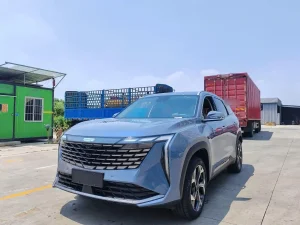With the global need for affordable automobiles growing, exporting of used cars from China has become a very lucrative business. For example, robust growth of the used car industry in China— where more than 17 million vehicles are transacted each year — means large numbers of well-maintained vehicles become available for consumers on a budget. Importing a used car from the USA to overseas market is quite different than purchasing say in Canada or other countries and involves multi-level process including logistics, regulations etc.
The first step to export second hand cars from China is selecting a reliable supplier or platform. ISRAEL’S AUTOCANGO exports used cars globally. A wide range of vehicles available with full details (specifications, high-quality images and inspection report). Autocango also runs a multilingual platform and manages export logistics so that international buyers can buy with as little friction around cross-border transactions.
After that, the vehicle is chosen and he moves on to do some paperworks including quality compliance. For this purpose some main documents are requested, like the Certificate of Origin of the vehicle; in other words you should be sure that your car is legal (and not counterfeit or illegal produced); then it need also to have an export license and inspection certificate. InspectionChina Entry-Exit Inspection and Quarantine Bureau (CIQ) requires extensive inspection to meet both domestic and international safety, pollution control regulations. In the context of age, emissions compliance and equipment requirements such as safety features- these can vary based on destination country/region. For instance, some African countries have bans on vehicles older than eight years also while European markets mandate adherence to Euro 6 emissions standards.

Another integral facet of the export process is Shipping logistics. After purchase, most vehicles are loaded onto Roll-On/Roll-Off (RoRo) vessels or they are stuffed into containers according to the buyer's choice and budget. RoRO shipping is often cheaper for large orders, where container ships are generally more suitable when it comes to valuable vehicles because they can be protected from outside. Shipping fees average from $1,000 to $3,000 for each vehicle price in line with the vacation spot and technique selected. Shipping time is usually compiled with 20 to 45 days depends on the destination port and since of customs clearance.
Another very important step is the clearance in your destination. These costs are country-specific (fees like import duties, taxes, etc) and these charges can be so high sometimes that the lump sum you will spend for bringing a used vehicle from China could interferingly increase. For instance, in Nigeria import duties on used cars can be as high as 35% of the car value and other additional taxes that come close to Kenyan levels amounting up to 45%. Buyers can factor these costs into their budget, knowing exactly what to expect before they pay the extra expenses.
For an easy export experience, most buyers rely on trusted car exporters and shipping agents. They take care of everything from logistics, documentation and customs clearances for their buyers to concentrate on the vehicles they are after hence simplifying your business operation. Industry experts suggest that as much as 30% of delays can be reduced when an experienced logistics partner is involved and standard pitfalls, e.g., missing documentation or compliance checks are made.
Last but not least, the demand and profit of selling product in destination country. Local demand for Chinese-made vehicles drives the resale value of certain brands and models–of used cars, some more than others. Affordability and assurance on reliability meant emerging markets have given quite widespread customization to,amongst others, Geely and BYD. Alternatively, for businesses exporting to these areas paying attention to the most demanded models can result in quicker sales and greater profit margins. Further, providing after-sales services as well as availability of spare parts can increase customer satisfaction and drive repeat business.
To sum up: The export of used cars from China considers reasonable planning, compliance with regulations and logistics. Buyers can easily manage the complexities of international trade and leverage upon a rising requirement for inexpensive vehicles across geographies by collaborating with dependable platforms & professionals. With some know how in terms of business planning, exporting used cars from China can be a lucrative endeavor that caters to the varying demands seen across different global markets.